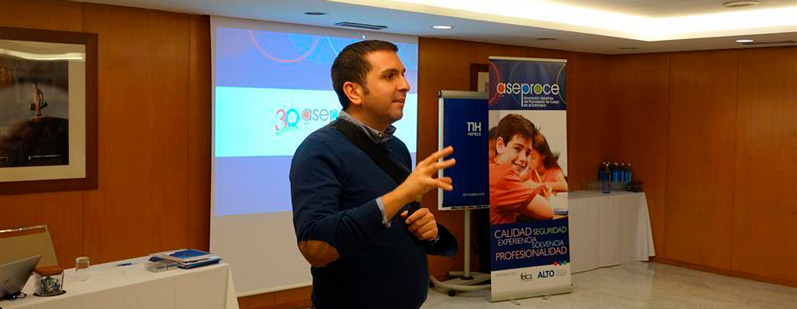Fuente: Study Travel. Spanish agency association highlights market trends. 08:55 | 25 January 2018
Spanish agency association Aseproce highlighted growing trends in Spain’s outbound business, including academic programmes and mini-stays, as well as threats to the agency sector in a speech at the StudyTravel Alphe Spain conference recently.
Oscar Porras, President of Aseproce, delivered a presentation on the work of the association on the first day of the conference, which also formed one pillar of the inaugural Malaga Education Week.
He said that academic year programmes were becoming increasingly popular for Spanish students, and added that Canada and Ireland, as more affordable destinations, were the main beneficiaries of this trend.
Canada, generally, is becoming a more popular destination for Spanish students, Oscar said. Neighbouring USA, meanwhile, has become more of a «difficult sell» in the Trump era, with agencies having to work harder to explain and promote the programmes that they know to be good quality.
The growth of mini-stay programmes, particularly in the winter months, is continuing to impact on the sector, with a number of Spanish agencies now specialising in these.
However, he added that a controversial issue is that some primary and secondary schools in Spain are contacting language providers overseas directly to arrange mini-stay programmes. As schools are not registered travel agencies, they do not hold insurance cover, Oscar explained.
Within the adult language sector, it was becoming more common for students to opt for shorter, more intensive courses – particularly exam preparation programmes, delegates were told.
Spanish agencies are increasingly seeking variations on the traditional summer offerings, especially in the areas of technology, sports, exam preparation, intensive language and real immersion, he advised.
A Spain agency survey article to be published in the February 2018 issue of StudyTravel Magazine shows an average 18 per cent business growth in the last year among the 16 agencies surveyed, and highlights the UK’s continued dominance of the Spanish market, accounting for more than half of all bookings among participants.
Commenting on other challenges for the sector, Oscar said that there were as many as 500 unaccredited agencies operating in Spain, with many of these not paying VAT and therefore undercutting the prices of the genuine agencies. «Agencies are seeking fair play,» he said.
Commenting on the work of the association, Oscar said that Aseproce was one of the more active agency organisations and had initiated a number of changes over the last five-to-10 years, notably in auditing members through a third party.
Following the presentation, a lively Q&A session followed with a number of questions focused on the Spanish preference for homestay accommodation and the capacity issues that that can create in the summer.
Oscar commented that Spanish families have some of a «romantic ideal» of homestay that perhaps does not necessarily reflect the reality. He commented that schools need to be able to offer something guaranteed in the homestay portfolio – such as proximity to the school or commitment of only one Spanish student – so that agents can reassure parents.
Aseproce celebrated its 30th anniversary in 2017, and is a member of the Federation of Education and Language Consultant Associations (Felca).
See StudyTravel Magazine’s news section for a report on Malaga Education Week, and Grapevine gallery for photos from ST Alphe Spain and some of the subsequent agent fam trips.
By Matthew Knott
News Editor







